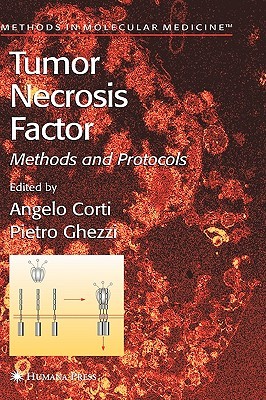
- We will send in 10–14 business days.
- Publisher: Humana Press
- ISBN-10: 1588292231
- ISBN-13: 9781588292230
- Format: 16.2 x 23 x 2.6 cm, kieti viršeliai
- Language: English
- SAVE -10% with code: EXTRA
Tumor Necrosis Factor (e-book) (used book) | bookbook.eu
Reviews
Description
Tumor necrosis factor (TNF)-? is a pleiotropic cytokine involved in a va- ety of physiological and pathological processes. After initial discovery of its ability to induce cell death and animal cachexia, it was soon realized that this cytokine played pivotal roles in the regulation of homeostasis and inflam- tory-immune responses. This led to an explosion of interest in basic and tra- lational research activities on the role of TNF in many diseases, such as cancer, septic shock, rheumatoid arthritis, and infectious diseases of the central n- vous system. Because of its potential therapeutic value, many academic and industrial research groups have worked to discover compounds that can block its activity. These studies have led to the approval of anti-TNF antibodies and soluble TNF receptors for the therapy of rheumatoid arthritis and Crohn's d- ease. TNF also can be an attractive anticancer agent capable of damaging tum- associated vessels and of inducing tumor necrosis in patients. The unique properties of TNF have led to its registration as a drug for locoregional tre- ment of sarcomas of the extremities, and stimulated many preclinical studies aimed at improving its therapeutic index for systemic use. Tumor Necrosis Factor: Methods and Protocols provides an overview of basic and translational research along with a series of practical procedures on TNF production, characterization, mutagenesis, detection in biological spe- mens, as well as several in vitro assays and animal models for studying the role of TNF in various diseases.
EXTRA 10 % discount with code: EXTRA
The promotion ends in 21d.03:52:22
The discount code is valid when purchasing from 10 €. Discounts do not stack.
- Publisher: Humana Press
- ISBN-10: 1588292231
- ISBN-13: 9781588292230
- Format: 16.2 x 23 x 2.6 cm, kieti viršeliai
- Language: English English
Tumor necrosis factor (TNF)-? is a pleiotropic cytokine involved in a va- ety of physiological and pathological processes. After initial discovery of its ability to induce cell death and animal cachexia, it was soon realized that this cytokine played pivotal roles in the regulation of homeostasis and inflam- tory-immune responses. This led to an explosion of interest in basic and tra- lational research activities on the role of TNF in many diseases, such as cancer, septic shock, rheumatoid arthritis, and infectious diseases of the central n- vous system. Because of its potential therapeutic value, many academic and industrial research groups have worked to discover compounds that can block its activity. These studies have led to the approval of anti-TNF antibodies and soluble TNF receptors for the therapy of rheumatoid arthritis and Crohn's d- ease. TNF also can be an attractive anticancer agent capable of damaging tum- associated vessels and of inducing tumor necrosis in patients. The unique properties of TNF have led to its registration as a drug for locoregional tre- ment of sarcomas of the extremities, and stimulated many preclinical studies aimed at improving its therapeutic index for systemic use. Tumor Necrosis Factor: Methods and Protocols provides an overview of basic and translational research along with a series of practical procedures on TNF production, characterization, mutagenesis, detection in biological spe- mens, as well as several in vitro assays and animal models for studying the role of TNF in various diseases.


Reviews